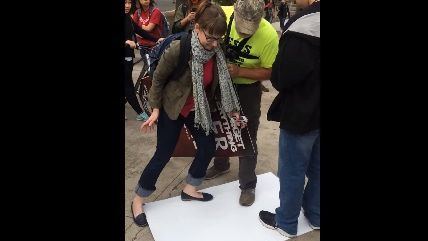Students Attack 'Triggering' Anti-Abortion Sign, Cop Says Free Speech Has Limits on Campus
'What I'm here to tell you is that on campus we have additional rules other than just freedom of speech,' said the cop.


Students at the University of Oregon clashed with an adult anti-abortion preacher earlier this week, eventually grabbing his graphic sign, tearing it, and stomping on it. One student told him, "this is not part of your First Amendment right."
But the students weren't the only ones with a faulty grasp of what the First Amendment entails. A campus police officer initially told the preacher that he could continue to speak about his views only if he put away the sign and refrained from making incendiary statements comparing abortion to the Holocaust.
"What I'm here to tell you is that on campus we have additional rules other than just freedom of speech," the officer told the preacher. When pressed, the officer maintained that university administrative ordinances prohibited offensive and demeaning public expressions.
Obviously, the cop was wrong—something that a second officer realized immediately after appearing on the scene. This cop, a sergeant, demonstrated a much stronger awareness of the law. He calmly put the other officer in his place, stating, "My only concern is that there is no physical violence. If everybody is going to stay and yell and scream, that's fine. As long as there's no violence, we're done."
Later, a mob of students approached the preacher and damaged his sign.
The frightening and frustrating exchange was captured on video. According to The Daily Emerald:
History major Allison Rutledge was the first to damage the anti-abortion activist's poster. She stood on it and claimed that the activist didn't have a right to display the graphic imagery. The video doesn't make it clear when the anti-abortion activist's sign ends up on the ground (it cuts before the action happens).
"This is my property," the activist said as Rutledge stood on his sign. "Just leave us alone."
The video cuts after a while, but Rutledge is later seen leading a chant in order to get the anti-abortion activist to leave University of Oregon property.
"All I'd like to say about why I decided to actually take the sign from him is I realized it was his property, but it was a piece of paper. I considered the sign obscene and offensive and intending to anger and start a scene," Rutledge said when contacted for comment. "I didn't want to look at that obscenity."
She called the incident a tussle before saying that she felt emotionally threatened by the anti-abortion activist's sign.
"There's a limit to what people should be forced to look at," Rutledge said. "We didn't like it and we actually made him put his sign away. We had no problem with his opinion, but it was his sign. You can't just show whatever you want."
This is a sentiment one encounters often on public university campuses: You can't just show/say/think whatever you want. There's just one problem with it: it's wrong in a very precise legal sense. People have an explicit, Court-recognized right to engage in very offensive and disturbing speech on public property. Even if that speech is "triggering" (a claim made by the student-protesters, who wanted to shield others from the emotional harm of seeing the sign). Even if that speech is deeply racist and contemptible, as it was on the SAE bus at the University of Oklahoma.
Something to note: As Reason's Stephanie Slade and Katherine Mangu-Ward have both pointed out, people who would like to live in a world with stricter parameters on acceptable speech should actually be in favor of more privatization and fewer government-run or government-owned spheres of influence. The First Amendment prevents public institutions from taking punitive actions against people for possessing abhorrent views. If students want to live on a campus where offensive speech can result in institutional punishment, they should check out those greedy, profit-driven (or religiously-motivated) private colleges—and demand more of them.
